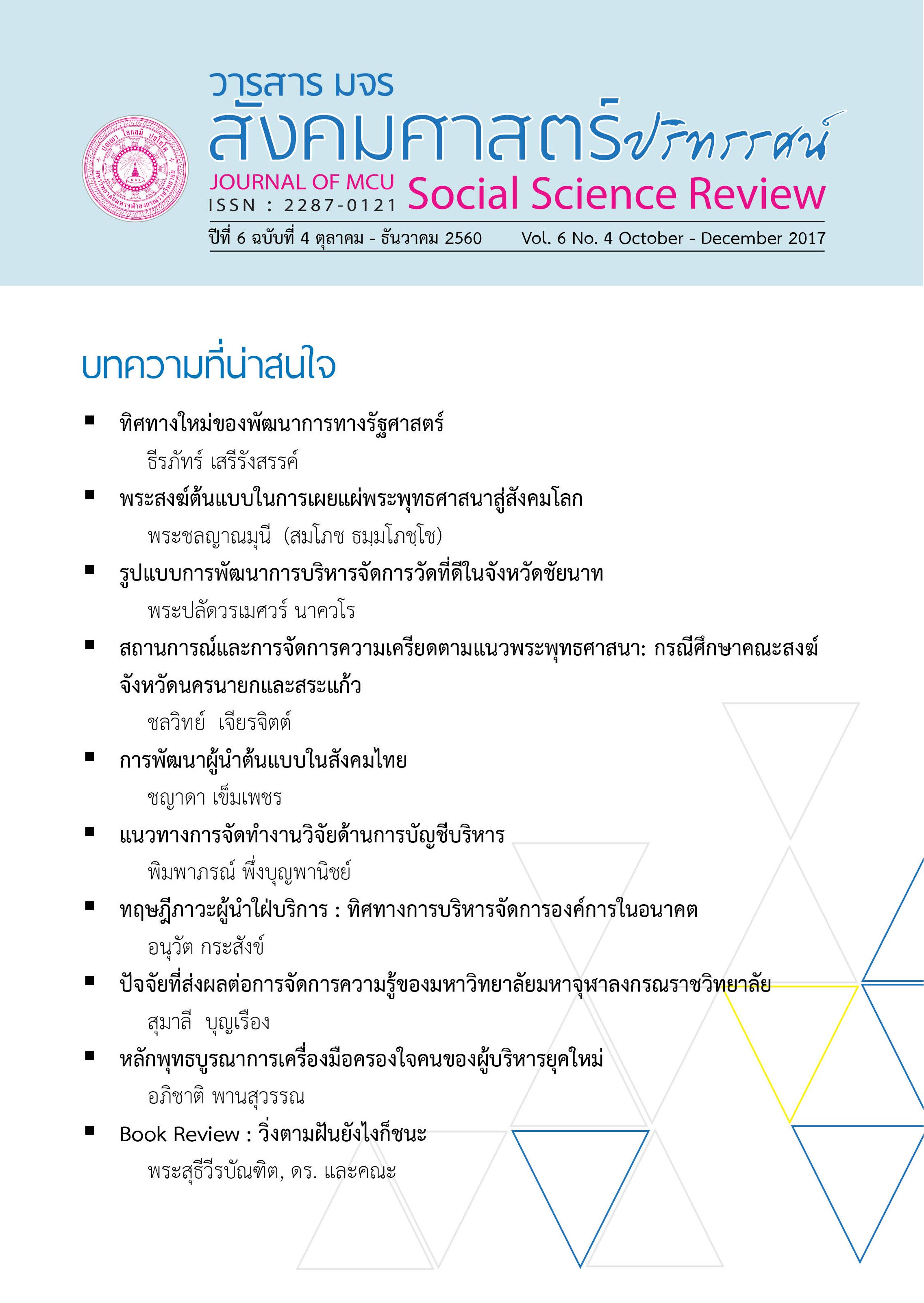การพัฒนาวัฒนธรรมองค์กร คณะศิลปศาสตร์ มหาวิทยาลัยเทคโนโลยีราชมงคลสุวรรณภูมิ
คำสำคัญ:
วัฒนธรรมองค์กร,การพัฒนา,มทร.สุวรรณภูมิบทคัดย่อ
บทความนี้มีความมุ่งหมาย 1) เพื่อศึกษาประวัติความเป็นมาของวัฒนธรรมองค์กร คณะศิลปศาสตร์ มหาวิทยาลัยเทคโนโลยีราชมงคลสุวรรณภูมิ (มทร.สุวรรณภูมิ) และ 2) เพื่อศึกษาสภาพปัจจุบัน ปัญหา และแนวทางการพัฒนาวัฒนธรรมองค์กร คณะศิลปศาสตร์ มทร.สุวรรณภูมิ โดยใช้วิธีดำเนินการวิจัยเชิงคุณภาพ เก็บรวบรวมข้อมูลจากเอกสารและทำการเก็บข้อมูลภาคสนาม พื้นที่วิจัยใช้วิธีเลือกแบบเจาะจง ได้แก่ ส่วนงานภายในคณะศิลปศาสตร์ มทร.สุวรรณภูมิ ประชากรและกลุ่มตัวอย่าง ได้แก่ ผู้บริหาร ข้าราชการ พนักงานมหาวิทยาลัยสายวิชาการและสายสนับสนุน พนักงานราชการ ลูกจ้าง ของคณะศิลปศาสตร์ มทร.สุวรรณภูมิ จำนวน 40 คน เครื่องมือที่ใช้ในการวิจัย
คือ แบบสังเกต แบบสัมภาษณ์ การสนทนากลุ่ม และการประชุมเชิงปฏิบัติการ ตรวจสอบข้อมูลด้วยเทคนิคการตรวจสอบแบบสามเส้า วิเคราะห์ข้อมูลเชิงคุณภาพตามความมุ่งหมายของการวิจัย และนำเสนอผลการวิจัยแบบพรรณนาวิเคราะห์
ผลการวิจัยพบว่า 1) ประวัติความเป็นมาและวัฒนธรรมองค์กรในอดีตของคณะศิลปศาสตร์ มทร.สุวรรณภูมิ ประกอบด้วยวัฒนธรรมองค์กรใน 6 ด้าน ได้แก่ 1) ด้านการสื่อสาร 2) ด้านการมีวินัย 3) ด้านการมีจิตสาธารณะ 4) ด้านการมีส่วนร่วม 5) ด้านประชาธิปไตยในองค์กร และ 6) ด้านความสามัคคี ซึ่งในอดีตจะมีการปฏิบัติต่อกันเป็นเครือข่ายที่แน่นแฟ้นอย่างเป็นรูปธรรม มีกิจกรรมร่วมกันในศูนย์พื้นที่อย่างสม่ำเสมอ สมาชิกในองค์กรต้องอยู่ภายใต้ระเบียบแบบแผนของราชการมีการช่วยเหลือกันตลอดเวลา มีความผูกพันฉันท์พี่น้อง และเห็นผู้อาวุโสในองค์กรเสมือนญาติผู้ใหญ่
2) ส่วนสภาพปัจจุบัน ปัญหา และแนวทางการพัฒนาวัฒนธรรมองค์กรของคณะศิลปศาสตร์ มทร.สุวรรณภูมิ ผู้วิจัยแยกนำเสนอผลการศึกษาใน 2 ประเด็น คือ สภาพวัฒนธรรมองค์กรในปัจจุบัน กับปัญหาวัฒนธรรมองค์กรปัจจุบันและแนวทางการพัฒนาวัฒนธรรมองค์กร โดยภาพรวมของวัฒนธรรมองค์กรใน 6 ด้าน พบว่า รูปแบบการสื่อสารทั้งแบบเป็นทางการและไม่เป็นทางการมีช่องทางในการสื่อสารหลากหลาย อาทิ โทรศัพท์ โทรสาร เอกสารทางราชการมีเทคโนโลยีสารสนเทศที่ทันสมัยมีการกำหนดกฎระเบียบไว้อย่างชัดเจน ทุกคนอยู่ภายใต้ระเบียบแบบแผนของทางราชการ มีโครงการพัฒนาบุคลากรด้านคุณธรรมจริยธรรม มีการปรับทัศนคติให้บุคลากรตระหนักเรื่องการมีจิตใจใฝ่บริการอย่างต่อเนื่องมีการร่วมมือกันประเมินองค์กรเพื่อให้มีประสิทธิภาพสูงขึ้น ด้วยการวิเคราะห์สภาพแวดล้อมภายในและภายนอกองค์กร ร่วมกันระบุจุดแข็ง จุดอ่อน โอกาส
และอุปสรรค เพื่อนำไปสู่การกำหนดวิสัยทัศน์ในการพัฒนาองค์กรร่วมกัน ยึดหลักประชาธิปไตยในการบริหารคณะ ส่งเสริมให้ทำงานเป็นทีมมากขึ้น ซึ่งทั้งหมดที่กล่าวมา นำไปสู่แนวทางการพัฒนาวัฒนธรรมองค์กรของคณะศิลปศาสตร์ มทร.สุวรรณภูมิ ในภาพรวมของวัฒนธรรมองค์กร
ดังนี้คือ การสร้างความตระหนักและส่งเสริมเรื่องคุณธรรมจริยธรรมในการรับและส่งต่อข้อมูลข่าวสารระหว่างกันอย่างถูกต้องครบถ้วนและสร้างสรรค์ จัดให้มีการเรียนรู้องค์กร และทำความเข้าใจกฎระเบียบให้มากขึ้น จัดอบรมแนวทางปฏิบัติตามระเบียบราชการใหม่ ๆ รวมทั้งรณรงค์ให้ปฏิบัติตามกฎปลูกฝังให้เข้าใจและตระหนักว่าตนเองเป็นส่วนหนึ่งและเป็นส่วนสำคัญในการพัฒนาองค์กร และควรมีการจัดกิจกรรม/โครงการเพื่อเรียนรู้ความแตกต่างทางความคิดของบุคลากรแต่ละช่วงวัย ตลอดจนจัดกิจกรรมสานสัมพันธ์ระหว่างบุคลากรให้มากขึ้น
เอกสารอ้างอิง
Faculty of Liberal Arts. (2015). Self-Assessment Report. Phranakhon Si Ayutthaya : Rajamangala University of Technology, Suvarnabhumi.
Nathathai Sodasri. (2015). Knowledge Management Strategies for Creating Organizational Culture of the Government Lottery office (Master’s thesis). Suan Dusit Rajabhat University.
Pannee Ae-Oi. (2015). Organizational Culture of Secondary School, Krabi Province . (Master’s thesis). Valaialongkorn Rajabhat University.
Piya Lamooman. (2013). Organizational Culture Affecting Learning Organization of Schools Under Pathumthani Primary Educational Service Area Office1. (Master’s Thesis). Rajamangala University of Technology, Thanyaburi.
Rachen Kaewpitak. (2014). Types of Organizational Culture Affecting Knowledge Management in Educational Institutions Under the Jurisdiction of Secondary Educational Service Area Office 8 (Master’s thesis). Nakhon Pathom Rajabhat University.
Phramaha Sunan Sunantho (Ruchiwet).(2016). Buddhist Integrated Approach to the Management of Buddhist Schools. Journal of MCU Social Science Review, 5(2), 31 -42.
Phrapalat Chaiphat Khantitharo. (2016). The Model of Administration Development for The Abbot In Sangha Administration Region VI. Journal of MCU Social Science Review, 5(2), 67 – 76.
The Ministry of Culture. (2003). Documents Used During the Seminar Attended by the Central and Regional Public Servants of the Cultural Ministry. Bangkok : The Ministry of Culture.
Waraphorn Sangtrong. (2014). The Relationship between Transformational Leadership and Organizational Culture on Learning. Organization of A.M.P. Construction 299 Company Limited (Master’s Thesis). Rajamangala University of Technology, Suvernabhumi.
ดาวน์โหลด
รูปแบบการอ้างอิง
ฉบับ
ประเภทบทความ
สัญญาอนุญาต
ลิขสิทธิ์ (c) 2017 วารสาร มจร สังคมศาสตร์ปริทรรศน์

อนุญาตภายใต้เงื่อนไข Creative Commons Attribution-NonCommercial-NoDerivatives 4.0 International License.
เพื่อให้เป็นไปตามกฎหมายลิขสิทธิ์ ผู้นิพนธ์ทุกท่านต้องลงลายมือชื่อในแบบฟอร์มใบมอบลิขสิทธิ์บทความให้แก่วารสารฯ พร้อมกับบทความต้นฉบับที่ได้แก้ไขครั้งสุดท้าย นอกจากนี้ ผู้นิพนธ์ทุกท่านต้องยืนยันว่าบทความต้นฉบับที่ส่งมาตีพิมพ์นั้น ได้ส่งมาตีพิมพ์เฉพาะในวารสาร มจร สังคมศาสตร์ปริทรรศน์ เพียงแห่งเดียวเท่านั้น หากมีการใช้ภาพหรือตารางหรือเนื้อหาอื่นๆ ของผู้นิพนธ์อื่นที่ปรากฏในสิ่งตีพิมพ์อื่นมาแล้ว ผู้นิพนธ์ต้องขออนุญาตเจ้าของลิขสิทธิ์ก่อน พร้อมทั้งแสดงหนังสือที่ได้รับการยินยอมต่อบรรณาธิการ ก่อนที่บทความจะได้รับการตีพิมพ์ หากไม่เป็นไปตามข้อกำหนดเบื้องต้น ทางวารสารจะถอดบทความของท่านออกโดยไม่มีข้อยกเว้นใดๆ ทั้งสิ้น





